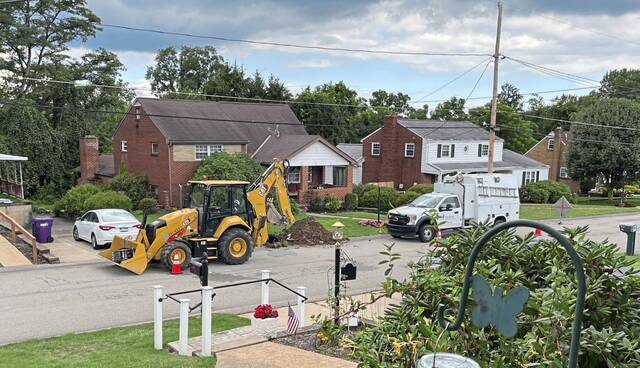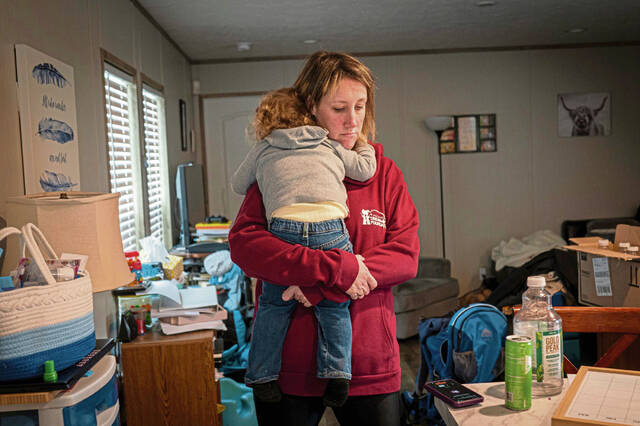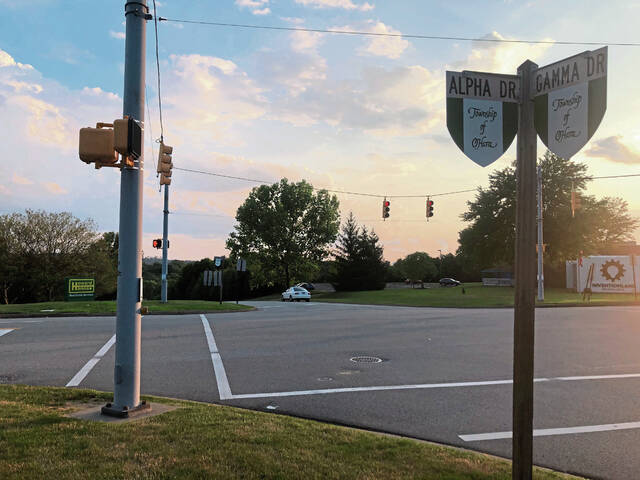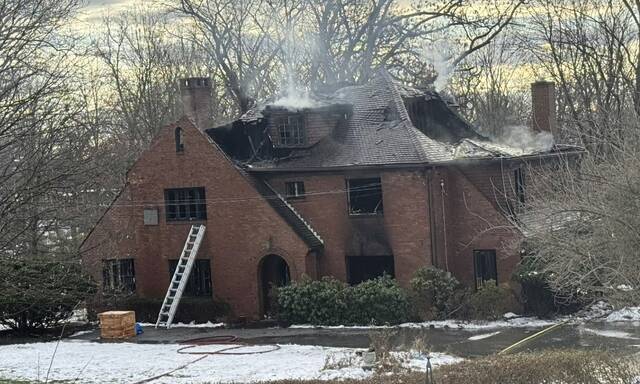Keeping a home fueled by natural gas safe is pretty simple, said Dennis Caveglia, who has operated Valley Plumbing & Heating in his native Leechburg for 40 years.
Caveglia, like many working with natural gas, wouldn’t hypothesize about what caused the Plum house explosion Saturday morning that killed six people and damaged a dozen homes in the Rustic Ridge neighborhood.
But the local business owner and others were quick to provide tips on staying safe.
Here are a few of his safety tips:
- Hire a professional to inspect your furnace at least once a year.
- Don’t forget to have your water heater inspected.
- Install carbon monoxide detectors throughout your home (carbon monoxide is flammable).
“You need to get quality people to do the work, whether it’s for a gas line or installing a gas appliance,” Caveglia said.
The lifespan of household items such as furnaces has changed since Caveglia opened his business a generation ago.
At one time, a furnace could last 40 years, he said. Today’s models, like some cars, are a little more disposable.
“The newer ones — I wouldn’t go over 15 years with them, personally,” he said.
The Allegheny County Fire Marshal’s Office confirmed that it’s aware the owners of the Rustic Ridge Drive house in Plum that exploded “were having hot water tank issues.”
For Caveglia, that spoke volumes.
If a homeowner installed a hot water tank on their own, something as small or simple as a cracked fitting could cause gas to leak in the basement and eventually fill the house, he said.
“I don’t think a lot of people know the dangers of it,” Caveglia told the Trib. “Gas is such a good thing. But it’s a bad thing, too.”
Lori Altrudo knows about how gas can be a bad thing all too well.
The Plum resident, who lives about a dozen houses away from the explosion site on Rustic Ridge Drive, said her kids have been attached to her “at the hip” ever since Saturday morning.
“I am scared at times. Could that happen to any of us? It could happen to any of us. I don’t know,” Altrudo said.
Related:
• Rustic Ridge community gathers in 2 places to honor the lives lost in house explosion• Remembering devoted mom who died in Plum explosion
• 2 Plum officials among house explosion deaths
• Remembering father and son who died in Plum explosion
• Outpouring of support for victims of Plum house explosion
• Complete coverage of the Plum house explosion.
Altrudo’s 10-year-old daughter, Sophia, was friends with Keegan Clontz, who died in Saturday’s blast. She is so shaken up she can no longer sleep through the night.
“(Monday) night was the first night sleeping at our house,” Altrudo said. “(Sophia) kept talking and talking. I have to remind myself not to be angry because I wanted to go to sleep.”
There are steps Plum residents — and others throughout the Pittsburgh area — can follow for reassurance after the explosion, officials said.
Peoples Gas, the utility company serving the Rustic Ridge Drive home that exploded, said it uses “three sensible words” about natural gas.
- Sight. Discolored soil or dead vegetation, as well as dirt or water blowing up from the ground, might indicate a gas leak.
- Sound. Hissing or high-pitched whistling noises could point to a leak.
- Smell. That infamous rotten-egg odor, which utility companies add to natural gas to make it detectable, could indicate a gas leak.
Michael Huwar, president of Peoples Gas, said crews were on Rustic Ridge Drive within 30 minutes of the blast Saturday. Gas was cut to affected homes within an hour.
“At this point, we can share that our system was operating as designed,” Huwar said. “It’s still too soon to estimate when service will be restored.”
Peoples Gas declined further comment for this story. Columbia Gas of Pennsylvania — which is based in Canonsburg, Washington County, and provides natural gas service in 450 communities in 26 Pennsylvania counties — also declined to comment.
The Energy Association of Pennsylvania, a trade organization in Harrisburg, said it’s important for homeowners to follow basic natural gas safety around their homes.
Pennsylvanians also have to remember to call before they dig in their yards, said Terrance J. Fitzpatrick, a former state Public Utility Commission chairman and now president and CEO of the energy association.
Homeowners and contractors must call 811 at least three business days before starting any digging or excavation project in Pennsylvania, as required by law, Fitzpatrick said.
Calling 811 connects people to the Pennsylvania One Call System, which is based in West Mifflin and aims to protect underground facilities, pipelines and more, PUC said on its website.
Fitzpatrick said it’s important to heed that rotten-egg odor.
“If you smell that, get out of the house immediately,” said Fitzpatrick, who feels homeowners should know what causing a spark in that environment could do. “Don’t make phone calls or turn on and off lights.”
Gas safety inspections also are necessary.
Constellation, an energy company with a Pennsylvania affiliate, said those inspections are conducted by a trained professional and include a check of gas-operated equipment and appliances, gas lines, vents and chimneys, and the measurement of gas through and out of your home.
Some towns require such inspections, according to Constellation. But, even if they’re not mandatory, these safety checks are highly recommended if any of your appliances, particularly a furnace or boiler, run on natural gas.
Columbia Gas of Pennsylvania deferred comment Tuesday to the American Gas Association, a trade group in Washington, D.C., representing 200 energy companies that provide natural gas to 180 million Americans.
Adam Kay, a spokesperson for that group, declined to speak about the Plum incident but added: “We’re always happy to provide safety information.”
The American Gas Association stresses three bullet points to understand natural gas safety:
- Teach natural gas safety early
- Smell gas? Act fast!
- Call 811 before you dig
American Gas Association said the natural gas industry “prides itself on being a safe, reliable provider of efficient energy.”
And, Caveglia said, don’t forget his last point: Install carbon monoxide detectors throughout your house.
One is good.
But two are better.
“Carbon monoxide is lighter than air, so it rises,” he said. “We like to tell people to install those detectors on the steps going up.”
Four people died in Allegheny County in 2020 as a result of carbon monoxide poisoning, according to the Allegheny County Health Department.
The year 2020, however, was an outlier. Nine people suffered carbon-monoxide-related deaths in 2019 and 13 died in 2018, according to health department figures. In both 2016 and 2017, there were eight deaths.
It remained unclear Tuesday whether the Allegheny County Medical Examiner’s Office tracked any other gas-related deaths. A county spokesperson said the data could not be produced in one day.
Tribune-Review Managing Editor Rob Amen contributed to this report.








